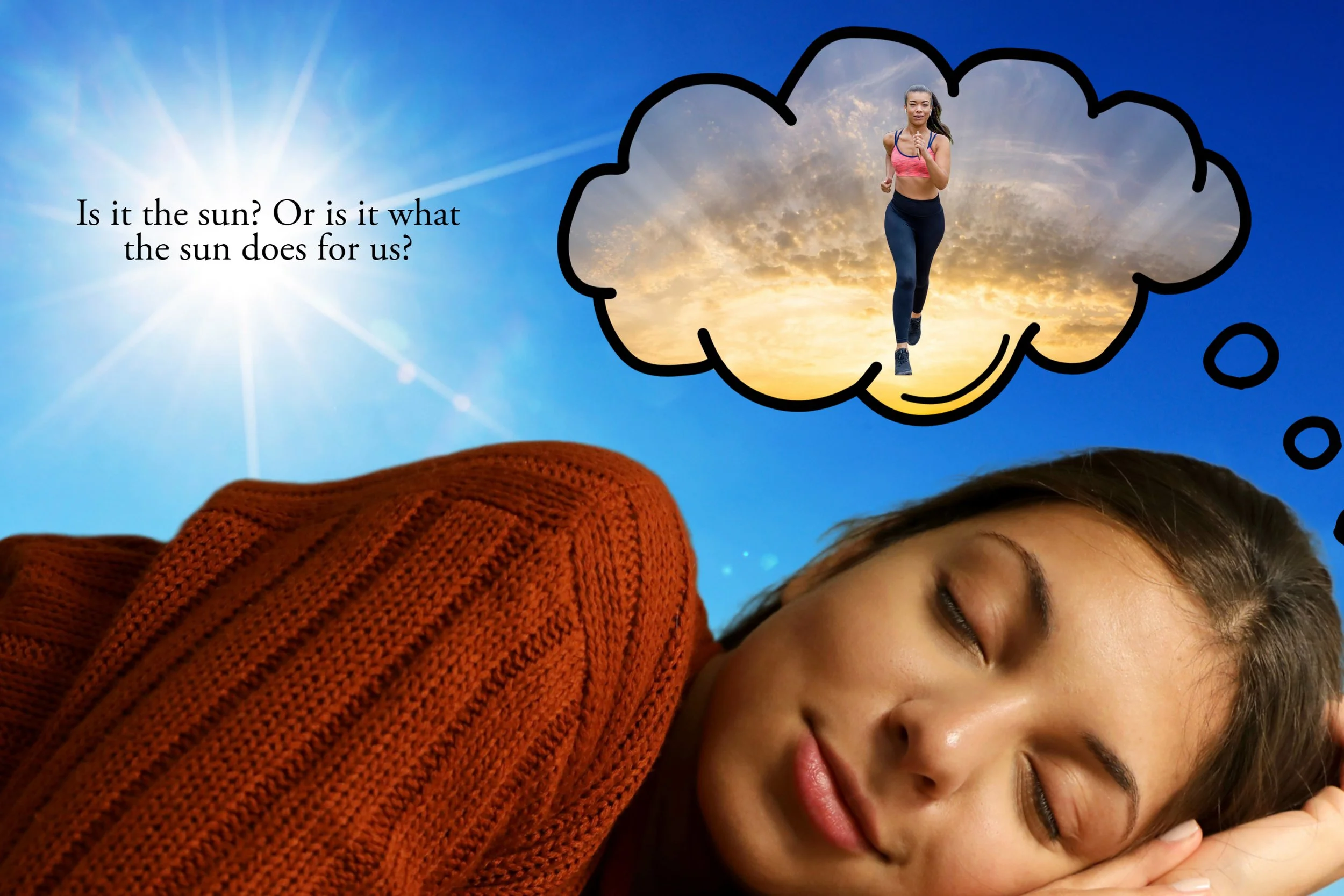Get More Sun and Live With Better Health
Get More Sun and Live With Better Health
Tim O’Connor – Center for the Preservation of Humanity – 12/23/2022
Today in Sioux Falls the high temperature will not reach above zero degrees Fahrenheit. The windchill's are around -40 or so. Getting direct sunlight is not really a very good idea today because after about 5 minutes, exposed skin is subject to frostbite. Being as the US is under a cold bomb, Web MD decided to publish an article about how getting more sun may help achieve better sleep.
“Getting More Daylight Could Mean Better Sleep At Night” characterizes research conducted by a biologist at Seattle’s University of Washington named Horacio de la Iglesia. Iglesia studied the sleep cycles of 507 University students to determine that they went to sleep later when the days were shortened. And, of course, he suggested that to correct this people should get outside, even during winter to get some direct sunlight, particularly in the morning. He also warned of screen time and it’s ability to mess with our sleep rhythms.
Iglesia and WebMD used several unfamiliar terms related to sleep. Chronotype refers to, as the Sleep Foundation describes, “Chronotype is the natural inclination of your body to sleep at a certain time, or what most people understand as being an early bird versus a night owl. In addition to regulating sleep and wake times, chronotype has an influence on appetite, exercise, and core body temperature. It is responsible for the fact that you feel more alert at certain periods of the day and sleepier at others.” According to the WebMD article, “Social jet lag is the difference in sleep timing between the weekend and weekdays, “and that also is predictive of poor health,” de la Iglesia says.”
The negative health implications associated with poor sleep are described by Karin Johnson of the Baystate Regional Sleep Medicine Program in Springfield, Massachusetts. “A later midpoint of sleep – defined as the halfway point in clock time between falling asleep and waking up – evening chronotype, and more social jet lag are “strongly associated with many health problems,” Johnson says. Metabolic syndrome and obesity, cardiovascular issues, depression, anxiety, and poorer performance and thinking skills are examples.”
Sunlight is much more important than thought however. It has been observed that health is impaired during the winter months. We generally try to stay inside more often, wear clothing which covers more of our skin, and, of course, the days are shorter and the sunlight which we do receive is not as strong as it is in the summertime. All of this creates vitamin D3 deficiencies.
According to a 2013 National Institutes of Health publication, lack of exposure to sunlight means people produce less vitamin D3. The report notes that vitamin D3 creation “influences a large number of biologic pathways which may help explain association studies relating vitamin D deficiency and living at higher latitudes with increased risk for many chronic diseases including autoimmune diseases, some cancers, cardiovascular disease, infectious disease, schizophrenia and type 2 diabetes. A three-part strategy of increasing food fortification programs with vitamin D, sensible sun exposure recommendations and encouraging ingestion of a vitamin D supplement when needed should be implemented to prevent global vitamin D deficiency and its negative health consequences.”
So maybe it is vitamin D3 deficiencies which are causing the problems associated with sleeping.* WebMD and Iglesia failed to mention there being even a possibility of vitamin D3 playing any role in poor sleeping habits. What is really striking are the number of ailments attributed to poor sleep as well as vitamin D3 deficiency. So what does Iglesia’s study really show? Nothing. It shows absolutely nothing because the study didn’t take vitamin D3 into account, nor caffeine use, the fact that people have different needs day-to-day, stress levels, and a host of other externalized variables. So, do you want to have decent sleep? Have a decent diet.
What really concerns me; however, is just how far these researchers seem to be willing to go to avoid mentioning proper nutrition in general and vitamin D3 in particular. It is telling that in a study looking at how sunlight exposure promotes sleep that the obvious correlation – increased vitamin D3 levels – were not considered at all. Our body’s are synergistic and when a vitamin, mineral, or amino acid is lacking, people run into trouble. Maybe the next sleep study will include an analysis of proper nutrition in it. It seems to me that proper nutrition is far more important than getting up in the morning and going for a walk.
In 2013 the NIH published that paper about the importance of vitamin D3 yet, since the outbreak of COVID-19 I have yet to see any mainstreamed suggestion to take steps to boost the immune system. I’ve seen lots of promotion of deadly pharmaceuticals and medical interventions. There is a tremendous emphasis on the supposed safety and efficacy of certain vaccines and massive encouragement to receive one, two, three (I think some places are on round 6) doses as well as other shots. I don’t see where it is advised to make sure that proper nutrition is paid attention to in order to avoid becoming ill from not only coronavirus but many other ailments. The NIH went from suggesting people supplement vitamin D3 to not once mentioning that people should start taking it immediately to bolster their immune systems. This is despite study’s showing vitamin D3 deficient individuals having worse outcomes when dealing with COVID-19. The effects of vitamin D3 in the human body didn’t change – monstrously profitable death drugs, incentive schemes for the use of certain protocols, and vaccines arrived to make certain medical ‘professionals’ bundles of money, that’s what changed. They murdered us to make some scratch while their overlords used the fear to control everyone who watched mainstream media.
WebMD published their version of the truth about COVID-19 and vitamin D quietly on June 11, 2021. “While vitamin D boosts your immune system and eases inflammation, experts say more research is needed on its antiviral properties.” The article goes on to note a variety of studies which offer no guidance whatsoever. Other problems associated with low vitamin D levels are listed and ways to get more vitamin D are also listed along with what is possible if too much vitamin D is ingested. At no point does the article recommend taking making sure that people are getting enough vitamin D. Apart from vitamin D, WebMD actually found only ONE treatment which may possibly be effective out of the 29 listed – zinc.
About zinc, if you will recall, the NIH decided that making money off of known deadly drugs was better than allowing treatment to be conducted with zinc and hydroxychloroquine. Against the NIH’s deadly advice, the late Dr. Zelenko used zinc, hydroxychloroquine, and azithromycin in patients who had early stages of the disease. In high risk patients the treatment worked 99.3% of the time and for those with low risk it worked all of the time. The problem is that Zelenko’s entire treatment only cost $20 and that the NIH wouldn’t see any of that paltry amount. Thus, they wrote about Zelenko’s treatment in order to continue banking (and murdering people with remdesivir and ventilators and, later, demanding taking the death shot), “In conclusion, zinc supplements did not add value or enhance the clinical efficacy of HCQ. Zinc supplementation may be studied further with other drug regimens for COVID 19, but it did not add any clinical values when added to HCQ.”
And WebMD backed the NIH murderers up. WebMD still lists their prevention tactics as get vaccinated, mask up, wash your hands, don’t touch your face, social distance, and sterilize everything around you. Emergency plans, contact lists with the county health department’s phone number on it, and setting up quarantine locations in your residence are also discussed. About Zelenko’s treatment, WebMD wrote, “[e]arly in the pandemic, the antimalarial drugs hydroxychloroquine and cloroquine were considered as possible treatments. The FDA later recesinded an emergency use order because studies found that the drugs were ineffective and the risks outweighed the benefits.”
It is the likes of WebMD to ask why it is that people no longer trust them. It is because they are liars. Not only do they tell bold-faced lies but they very often lie by omission. The reporting they did, the uncritical, biased, and honestly, stupid article they published about going outside and getting some sunshine to help one sleep better is a prime example of that loss of trust. The only thing the sleep article did for me was remind me that WebMD hates everything that is natural, hates non-medicated people, and hates anything even approaching holistic healing even when it involves basic, proper nutrition. It’s all remdesivir and patentable ivermectin knockoffs and experimental shots when known effective cures already exist. It’s all take walks in the morning light to fix your sleep but never mind that it also raises vitamin D levels, gets the body moving and the blood flowing, and accounts for no other variables other than sun exposure.
Want to start sleeping better?* Start eating better. First start eating REAL food – that means no bioengineered crap. Use food to address health concerns while still consulting with a trusted medical professional. I tried this once after a WebMD-educated doctor tried to prescribe 35 year old me statin drugs abut a dozen times. I asked for food alternatives and got a blank stare. After he regainsed his composure he decided I needed Welbutrin for smoking cessation which found me scolding him for the suggestion. At last he attempted, no fewer than a dozen times, to get me to voluntarily take a flu shot to no avail. TRUSTED doctors are rare, if you have one you are blessed. And as always, read the Bible, pray for discernment, and repent.
Bless God and God bless.
*I am in no way a medical professional. The opinions expressed are my own and nothing herein is meant to be construed as medical advice. Consult a TRUSTED medical professional.


